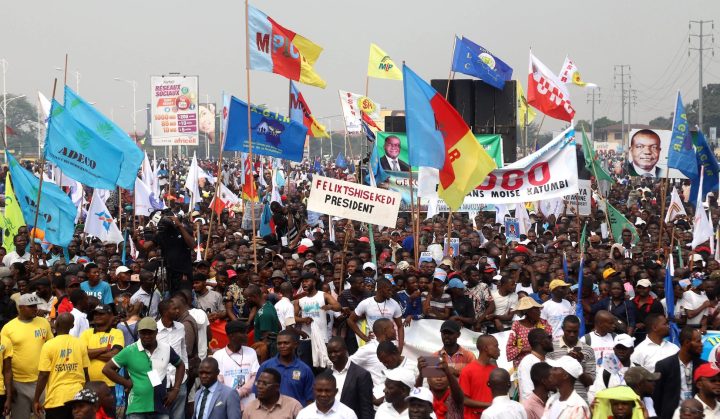ISS TODAY OP-ED
DRC voting day looms with potential violence and exclusion challenges in the mix

The country must maintain electoral integrity by facing its issues head-on.
Democratic Republic of the Congo’s (DRC) fourth election on 20 December will occur against a protracted conflict shaping the nation’s political landscape. These polls are plagued by numerous interconnected challenges likely to result in contested outcomes and political unrest.
A complex interplay of political turbulence and democratic aspirations characterises the backdrop of previous elections in the country. In 2006, following decades of authoritarian rule and violent conflict, the DRC witnessed its inaugural multi-party elections. Joseph Kabila controversially became president, with 58% of the votes, over Jean-Pierre Bemba’s 42%.
In 2011, Kabila’s contentious re-election led to violent protests and a disputed ballot outcome. Subsequent political tensions compromised the country’s stability. Initially scheduled for November 2016, the polls were postponed to December 2018. This sparked widespread anger and protests amid concerns about Kabila’s reluctance to step down after his constitutionally mandated second term.
Félix Tshisekedi won with 39.57% of the votes defeating Martin Fayulu’s 34.83%. Although the 2018 elections marked a historic peaceful transfer of power since independence in 1960, they were marred by allegations of vote manipulation favouring Tshisekedi.
Several hurdles must be overcome before this year’s voting to ensure participation, anticipate post-election mediation and prevent violence.
The appointment of Denis Kadima Kazadi, a close associate of the president, as head of the electoral commission (Ceni) sparked opposition protests. It is regarded as government’s attempt to obstruct the process. The controversy over the deployment of European Union (EU) election observers adds doubts, jeopardising the fairness of the process.
Security issues persist
The prevailing security challenges, especially in the eastern provinces, present a major obstacle, making electoral registration in Rutshuru and Masisi in North Kivu impossible. Those communities will be unable to participate in the upcoming presidential and legislative elections. The official electoral body confirmed that violence in eastern DRC would disenfranchise voters in North Kivu, and many displaced populations could also be excluded due to ongoing unrest.
This situation undermines the legitimacy of the elections, accentuating the sense of exclusion among eastern communities. In addition to this denial of a constitutional right, for many people in the DRC, voter cards have served as a sole form of national identity for decades. Not having access to them amplifies this feeling of abandonment. This potentially fosters further polarisation and creates a breeding ground for militias and armed groups that rely on community-based and ethnic mobilisation strategies.
In 2018, the Yumbi, Beni and Butembo couldn’t vote due to the Ebola epidemic and insecurity. Partial elections were later organised to remedy the situation. However, insecurity in North Kivu raises uncertainty about holding similar partial elections.
Logistical concerns
Logistical hurdles persist, with the distribution of voter cards and publication of electoral rolls still incomplete in some areas. According to interviews conducted by the Institute for Security Studies in Goma in early December, most polling stations were yet to receive electoral machines.
Another logistical problem is accessibility in certain parts of the country due to bad or non-existent roads. In previous years, the United Nations Organization Stabilization Mission in the DRC (Monusco) played a key role in deploying electoral equipment and teams. The decrease of Monusco presence in other provinces and some eastern territories, along with its imminent departure reduces this possibility. This could compromise access to certain areas, worsen security, and undermine inclusivity.
Read more in Daily Maverick: Is DRC heading for another chaotic election?
Finally, the electoral campaign has been peppered with recurrent references to identity, hate and exclusion speeches. Primarily between the ethnic groups or electoral strongholds of the leading candidates, in particular between Kasai natives supporting the outgoing president and the Katangese supporting Moise Katumbi. Discriminatory rhetoric against those deemed non-Congolese and violent incidents have also occurred in Kindu (Maniema) and Kinshasa.
These dynamics, along with the controversies in DRC polls since 2006, may undermine the election legitimacy, opening the door to post-election protests and violence in an already fragile context. Political turmoil and further instability can only be avoided with free and fair elections, especially in a political climate riddled with tension, fear, and disillusionment.
Civil society and influential religious leaders must continue their efforts to educate the public about their civic responsibility to vote and non-violence practices. This proactive engagement can enhance participation and help prevent outbreaks of violence.
The government and Ceni must ensure the transparency and credibility of the electoral process by removing barriers to the deployment of election observers and establishing effective monitoring mechanisms.
Regional partners, including the East African Community and International Conference on the Great Lakes Region, African Union and United Nations involved in the DRC, must anticipate the possibility of mediation. Preparing for mediation before and after the election results could help pre-empt disputes and mitigate the risk of violence from electoral tensions.
By implementing immediate remedial measures and fostering collaboration among stakeholders, the DRC can aspire to conduct elections that are not only credible but also contribute to lasting stability and democratic progress. DM
Remadji Hoinathy, Senior Researcher, Central Africa and Great Lakes and Nirvaly Mooloo, Intern, Institute for Security Studies (ISS).
First published by ISS Today.


















 Become an Insider
Become an Insider
Comments - Please login in order to comment.